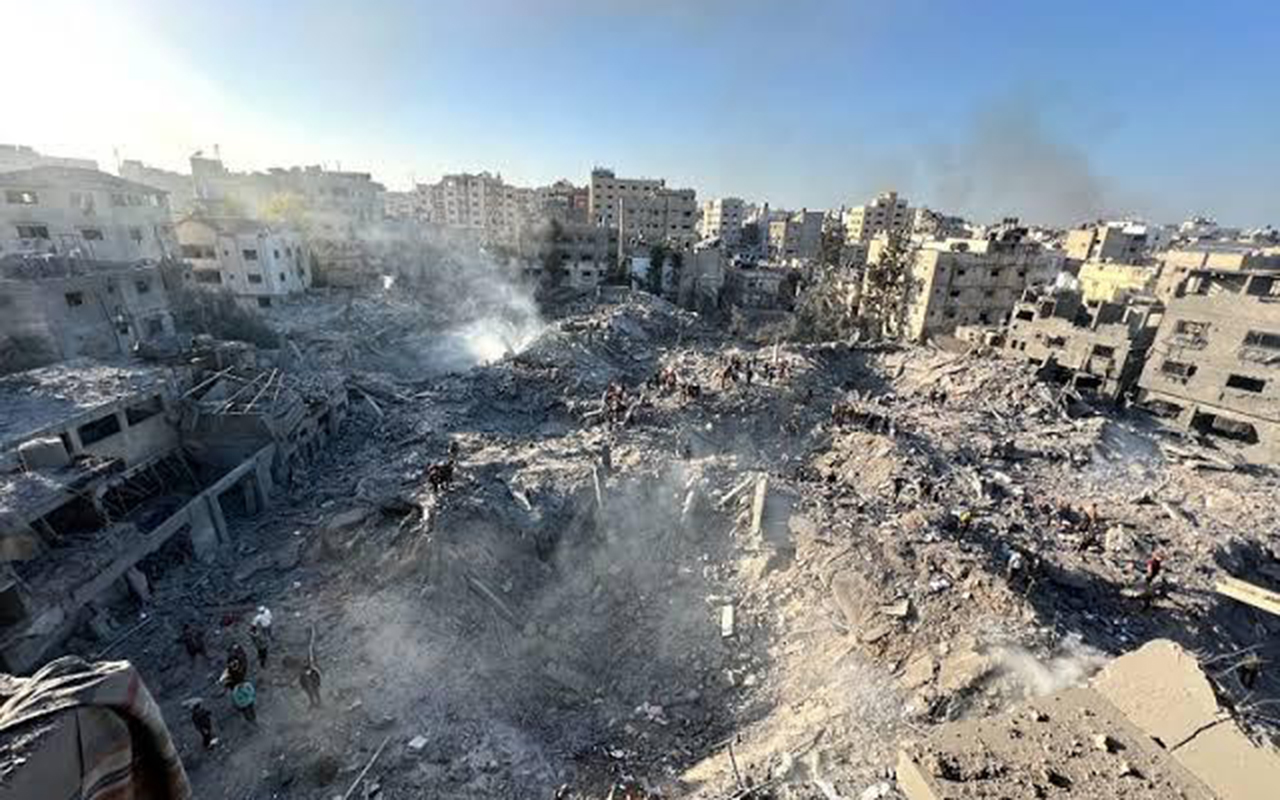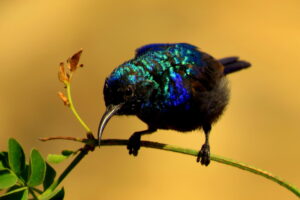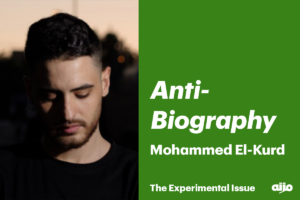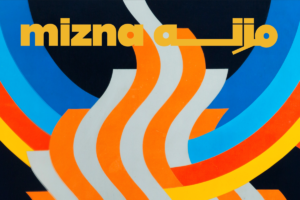
April 22, 2024
Autobiography of Gaza
by Diaa Wadi, trans. by Nour Jaljuli
It is with a heavy heart that we publish this new translation by Nour Jaljuli, a heart-wrenching, difficult, unflinching essay by Diaa Wadi, which was first published in Arabic last November in the New Arab and Gaza Story. That little has changed between then and now for Gaza is a supreme failure for which the entire Western neoliberal world order is to blame. That “ceasefire”—a bare minimum demand back in October—has come to lose all meaning as the horrors of Al-Shifa Hospital and other Zionist massacres unravel before our eyes, is the textbook definition of supremacy. We ask all readers to donate and spread the word about Diaa Wadi’s campaign to evacuate his family from Gaza. We ask all readers, especially those who are US-based, to sit with the weight of this essay—its every haunting image which, as Wadi reminds us, contains “a complete biography”—in hopes that it may sharpen our commitments to fighting for a free Palestine, from the river to the sea, in our words and in our actions.
—George Abraham, Mizna executive editor
Here we are: gathering our dusty, disheveled hair to weave a gray painting that surpasses the work of the greatest artists. It’s not yellow or blue, but entirely gray—blood gleaming in the center
—Diaa Wadi (trans. Nour Jaljuli)
Autobiography of Gaza
“The bombs are falling down on us like rain in al-Shuja‘iyya—continuous missiles, heavy carpet bombing.”
“Al-Shuja‘iyya is a ghost town. There’s no medical aid, no international committees, and the carpet bombing continues to no end. Electricity, water, and telecommunications are cut off.”
“Most of the bombing east of al-Shuja‘iyya is heavy. It shakes houses violently, like an earthquake. May God protect us. This night is a lot like the night of the 2014 al-Shuja‘iyya Massacre!”
Bodies resurrected by their creator to reveal a mangled image of the world, its systems, and the tradesmen of empty words. A hand’s fingertips point toward an abyss where injustice and its allies lie, with raging fangs and a lust for blood. A long stream of butterflies extends from the ground to the skies bearing the coffins of children. Alleyways brim with torched flesh, burned hair, and sawed bones. Take it all. You can now create however many tables you like and, upon them, display your alleged lamentation—words tattooed with repeated statements of condemnation. There’s no need for ink, there’s enough blood here to fill a bottomless pond.
Here we are: gathering our dusty, disheveled hair to weave a gray painting that surpasses the work of the greatest artists. It’s not yellow or blue, but entirely gray—blood gleaming in the center. A large convoy of grieving mothers with their chests open—you can see the void from which each child was snatched. What should we say? Aren’t the many scenes enough to silence tongues and whiten eyes? Haven’t hearts risen to throats? Haven’t lamps become flames that torch through the skin and draw a map of revenge, loss, and blood?
The director of Shuhada‘ Al-Aqsa Hospital: “Some of the cases that reach us have no traces of injury, but they were martyred because their organs have been torn apart by the immense pressure generated by the bombs when they detonated on the homes of peaceful civilians.”
They turn stone into water and free the fingertips that emerge from underneath the rubble. “Oh, mama, here’s her hair clip in my hand,” a Palestinian woman cries at the loss of her daughter.
A doll with a single remaining brow, a child left with one reproving eye. Arriving late, autumn took with it all the supple leaves. But it couldn’t disturb the roots. The graves multiplied, filling the homeland with musk and light.
Tareq Mustafa, who lost his entire family of thirty-three members, says, “My cousin the martyr Abu Ja’far, the martyr Sundos, and her children have all evaporated. Oh, people, we only found bits of hair, a jaw, and small fragments of limbs. After a deep search, we prayed the absentees’ prayer over them without any real remains of their bodies! Seven people, who the Occupation1 was not content with merely erasing from the civil record, but insisted on incinerating them to nothingness with its exploding barrels. Allah suffices me, for He is the best disposer of affairs! Arab rulers, there’s no need for you to open the border or send shrouds, God forbid, the Occupation is vaporizing entire families.”
Do not bury the skull, leave it so we may hit them with it after emptying the bag of remains at its final resting place, after we grind the remaining bones into flour to fill our bread-barren bellies . . . We never know, someone might eat a loaf of bread stained with the blood of their family.
I wait and scroll through pages of news. My mother texts me from Gaza, al-Shuja’iyya neighborhood specifically, that the bombing is intense. My entire family is now in one room of the house. For three years I have not seen my family, I have not touched my mother, have not kissed her hand, have not woken up to my siblings yelling and bantering. For three years, I’ve been afraid that this war would stab me in the deepest spot of my heart, and that I would lose them. Oh, God.
Most of the people martyred now, I know them. I’m scared of seeing more photos and news—my heart is in Gaza. “Allah, don’t break my heart with my family, friends, or neighbors. Protect them, Allah, we have no one but You.”
When I was in Gaza, I used to follow the war through the windows. With each bombing, I would open the window and know the target location from the smoke. Now, I flip through news channels, I read the news in its entirety, and I open the map on my phone to count the struck areas. How many houses are left? How many families are gone? This is my way until I calm down, and know that my family is still okay.
This is a long arrow, piercing through many collective minds on one tape, an exceptional case never before witnessed by the Strip, an eternal heaven to its residents. As they say, “Heaven is closer to us in Gaza;” all of them ready to journey through and ascend.
I have always kept a daily journal, summing up the whole day in phrases or short stories. A short while ago I drew a map of Gaza. Because I have Gaza memorized as though it were a small neighborhood, I started to cross out the blocks and areas that were destroyed. In previous aggressions, I used to note which buildings were gone, but now whole neighborhoods and towers are no more.
Breaking news on a massacre in the south: “The Occupation ordered them to vacate and leave their homes. Minutes from taking to the streets, they were bombed en masse by warplanes. So far, the massacre has resulted in seventy martyrs and two hundred wounded.”
I have always seen things from a different perspective. When I would hear the phrase “to target,” I would gather that their goals have been met.2 They have killed the dreams and stories of Gazans. Just like a football match, the better plane is the one that amasses the highest number of goals. “Breaking news: Urgent, new targeting; urgent, new targeting. Their task is easy, a soldier presses a button and scores another goal.
“Rahaf, answer your dad, please. Rahaf.” A father calls to his daughter under the rubble.
By now, there isn’t a family in Gaza that hasn’t eulogized at least one martyr. Only one martyr? A luxury, if so. Now, whole families are wiped from the civil record, mass graves are filled with families. Seventy-one members of a single family went to meet their creator and left behind a hemiplegic one-and-a-half-year-old baby girl. A ferocity we did not imagine. What we are witnessing now we had only read about in books about the world wars.
In war, the news competes with itself to leave the harshest impact on us.
I communicate with my family using two words: bombing and quiet. The situation is beyond tolerating, beyond explaining. For two days, I’ve been in front of news channels. My family is under the bombing, my grandfather’s household has been displaced, and the tall building where they live has been turned into mere rubble. In war, the news competes to leave the harshest impact.
I see most of my friends in Gaza in photos about their martyrdom. My beloved friend and neighbor Khaled is a martyr, my dear teacher is a martyr, as are most of my loved ones. Internationally prohibited phosphorus bombs slit the skins of children and innocent civilians. Ambulances are targeted in bombings, as are hospitals, rocks, and trees.
As they say, “Heaven is closer to us in Gaza,” all of them ready to journey through and ascend.
A current scene: a father carries his martyred son. In the background, a prayer is being held over martyrs. Wherever you walk, there’s a martyr. The situation is difficult and not simple. The bombings are extremely intense and incessant, the warplanes close, the explosions terrifying, the shooting endless.
I wish I were at war now. Terrifying mental exhaustion, no electricity, no connection, no water, no internet, no medical supplies, no gas, interrupted sleep—filled with nightmares—becomes continual wakefulness. Every minute and every second there’s bombing. It hasn’t stopped for a moment throughout the aggression. The mortuary refrigerators no longer have space, so they place the corpses in ice cream trucks, and now they’re piling them up on the ground. Every sixty seconds there are bombings, martyrs; there are obliterated dreams, ambitions.
“The Reception and Emergency Department is conducting operations using phone lights!”
For hours, I’ve been trying to get in touch with my family and neighbors. No one is answering and there’s no internet. I call through an international line and there’s no answer. Residential blocks have been decimated and turned into ash.
I look at the tree. Hanging from it is a pink decoration stitched with olives. I look closer and I find that it’s my sister’s lung from which comes a deep sound, a deranged melody that sharpens my sight. You understand that you’re destined to go through all of this. You give in to this sweeping grief, the grip that clutches at your heart every night. You understand exactly what mothers mean when they say their heart is on fire.
The heart cannot handle any more loss. News and images arrive and I’m scared of approaching and opening the messages. Anguish has consumed our faces, our features have turned into a map of pain. I don’t know how a human being can get used to this terrifying amount of loss. The places that forge memories—even the people, the heart’s holders—are all gone. Wind, dust, blood.
“For God’s sake, anyone who has any information, answer us please.”
Oh, God, bring the Day of Judgment upon us.
On October 14, I turned twenty-six years old. My mother texted me while bombs were flying above her head, “Happy birthday, yamma. May you live long.” This message made me collapse with all my senses, my body convulsed, the smell of my burning heart filling the room. What life, mother? A long life? I don’t want all of my life, I want to see you now, to hug you, to touch your face. . . forgive me.
* * *
Breaking news from Gaza’s hospitals: “Cesarean birth operations without anesthesia due to lack of medical supplies.”
Night fell, a scary and desolate night. A night turned into day, lit up by signs of terror and alarm with the intermingling voices of the bereaved, the tears of the bewildered, the bleeding of the sand, and many bags crowded with skin, hair, and fingers. A mother’s hand, a father’s arm, and a brother’s heart all formed together one body and slept in peace.
With a ragged heart, I left everything and directed my eyes and mind toward them. What I’m experiencing now is a real and certain death, a slow death of an indescribable torture.
Sometimes I pray and speak to the walls, sometimes I make du’a, and, sometimes I ask myself one question, “How will I go on with my life if I lose my family?”
My brother Bara’ left home when our youngest brother became hungry and there was no more bread. My mother begged him to stay, but he yelled at her, “We will not die of hunger!”

He went out to the street looking for bread.
I read the breaking news and I hope it isn’t about them. My heart is boiling. My family isn’t telling the truth. My brain wanders, my eyes can no longer see, and my heart throbs in my throat.
There’s one path that the Occupation created for Gazans to take: death. But this time the Occupation is merciful. It enhanced itself and its weaponry and now rockets kill entire families without leaving anyone or anything behind.
Breaking: “A state of panic overcomes cancer patients and medical staff due to the destruction of al-Sadaqa Turkish Hospital, the only cancer hospital in the Gaza Strip. It has sustained severe damage due to the Israeli Occupation targeting its vicinity continuously.”
They cut off the internet and stopped the network fully in the Gaza Strip. There’s no way to know about anything that’s happening. We’re at our wits’ end. What’s behind this blackout? Oh, God. I’m trembling all the time. I make international calls every second during the blackout. I make a call every moment as tears burn down my face. My heart has left my ribs. This is certain annihilation. Oh, God!
The sky is covered in a whiteness hiding the eye of the sun. White rises, followed by more white, a shroud followed by a bird, a cat, a dog, a horse.
My mother answers—may I never be deprived of my mother’s voice, may ِGod never take it away from me—and asks me, “Did you eat, yamma? Did you drink, yamma?” I ate depression and anguish, Mama, I drank bitterness, and its taste will never leave my throat as long as I live, oh, Mama.
If we were to look closely at our life in Gaza, we would find it disastrous, an unending series of attempts at acceptance and tolerance. We convince ourselves—as we do, every time—that everything will end soon. This “soon” is debilitating when it turns into days and weeks. They say, “the profits of war equal its sorrows,” except in Gaza, where we exit from one war to enter another.
One eyewitness says, “Every night, we say this is the most intense night, and with every massacre we think no horrendousness can exceed what we’ve witnessed. Then, something worse, uglier, and more painful comes.”
A few minutes ago, I was really thirsty because I kept swallowing my spit as I watched the news. Before I drank, I remembered my family. Any minute now, they will run out of water. Do I drink? Did my mother drink? How can I drink while my family . . .
“For the second time, we’ve survived and our life won’t end! We ask God for a good ending, mercy, and absolution.” This is what my beloved Yousef, my cousin, said while surrounded by my grandmother and aunts, their children, grandchildren, and in-laws, all together. My mind can’t comprehend this. When we say it’s indescribable, this is the most honest “indescribable” uttered in history.
I asked for time off. I was denied. I was fired! I haven’t gone to work in a week. But, my family? They drink only little, eat only bread, and every sixty seconds there’s carpet bombing! An atrocity within which I cannot comprehend work or any reality!
“I’m cold, I want Mama and Baba,” says a child wounded by the Occupation’s strikes.
The worst piece of news in my life repeats every day: “Heavy bombing on al-Shuja’iyya now.” Alaa, my brother, who survived the Baptist Hospital Massacre, with God’s grace, called me after the massacre, his feet unable to move out of fear. He told me, while crying, “Diaa, where are you my brother? Come.” This “come” broke me, it tore my heart into amputated remnants, paralyzed my movement and thinking until my only focus was how do I go, now? How do I enter the bombing with them?

A Gazan says, “We just buried my cousin’s corpse, a child, Bassem, headless. His head is still under the rubble!”
Every scene
Every voice
Every grain of sand
Every wrecked building
Every piece of flesh thrown around
Every martyr
Every body
Every hand
Every eye
Every shroud
Every mother
Every human!
Every—Everything has a story, a complete biography, a beating soul!
The journalist Wael al-Dahdouh, after the martyrdom of some of his family members: “They take revenge on us through our children? It’s okay.”
These are tears of humanity, not tears of cowardice, fear, or despair.
The calamity is now visible in our speech, features, voices, and movements. We’re nothing but a vessel that fills every day with more tragedies. We know them fully and smell their scent—burned flesh, butchered bodies, scattered remnants on trees and between houses. All of them have stories, dreams, memories, and loved ones. All of them are burning daggers that rend our hearts.
The Ministry of Health: “The death toll from the Israeli aggression reached 10,022 martyrs, and 25,408 civilians have been wounded since the onset of the Israeli aggression on the Gaza Strip.”
The Occupation has killed 192 health workers, destroyed 32 ambulances, targeted 113 health institutions, and forced 16 hospitals and 32 health centers to go out of service. Since the beginning of the aggression, 2,350 people are missing, 1,300 of whom are children.3
In my wildest fantasies, I sit and talk with my family about returning and rebuilding this wreckage with them, although I have my reservations about the word “wreckage.” Gaza has turned into sand, soil, rubble—yet we repeat what Ahmed Hijazi always says, “We’ll rebuild it.” Many hands that would have rebuilt it are gone, but we hold on to this idea because Gaza is stubborn. A Palestinian woman says, “We’re bombed every day. Our houses, our relatives, our families are all gone under the rubble. But we have a God, and, insha‘Allah, we rely on Him, and He will save us. We say to the world, ‘Whatever they do, whatever they carry out, we’ll remain, insha’Allah, and our message remains.’ We’re steadfast on our land, like a planted tree, and no matter how much they strip it bare it grows back again.”
A bastard plan makes its way down a large bloody passage and makes life in Gaza synonymous with death. This is the impossibility of survival. Even if the symphony of bombings comes to an end, they want us to see Gaza as a graveyard, where all of our dreams have also been buried, along with our days, our family and friends. They want to strip us of our love for it until we see it as nonexistent on this map. They don’t know that it’s the land of our resurrection—we die here and we’re resurrected here. They don’t recognize the truth that this map is what makes up our hearts, not the other way around.
- 1. The Occupation is a translation of al-iḥtilāl الاحتلال, the standard Arabic term used in Arabic to refer to the Zionist entity occupying Palestine since 1948. ↩︎
- 2. The words for goal (hadaf هدف) and to target (istahdafa استهدف) share the same root word in Arabic: ه د ف, ha-da-fa. While the former announces the scoring of a point in a sports match, the latter means to consider an object a valid goal or target (for bombardment, for instance). ↩︎
- 3. The figures in these two paragraphs reflect the numbers of martyrs at the time of initial publication on November 25, 2023. The updated figures can be found here. ↩︎
Editor’s note: The Arabic word Allah is left as is in this English translation in cases of direct address or in instances of commonly used phrases such as insha’Allah. Otherwise, Allah is translated simply as God.
The header photo, used with the permission of Diaa Wadi, is of his destroyed home in Gaza.
Diaa Wadi is a Palestinian writer and blogger. He studied mechanical engineering and has traveled to many countries speaking for the Palestinian cause at international events. Wadi believes in literature and writing as an effective tool of resistance against the Occupation. He writes about the life of Gazans and the details which are often overlooked by the camera. As Refaat Al-Areer said, “If I must die, / you must live / to tell my story.” Diaa writes on behalf of all those who left us, to honor the martyrs and send them eternal love—for the martyr Refaat Al-Areer, now more than ever. Diaa tweets @diaawadi2.
Nour Jaljuli is a translator and poet traversing between the worlds of Arabic and English. She holds an MA in literary translation from the University of East Anglia and is the Arabic translator of Rana Dajani’s Five Scarves. Her translations have appeared in ArabLit, Middle East Eye, Jummar, and the 2022 UEA MALT Anthology for which she was also coeditor. You can find out more about her work on nourjaljuli.wordpress.com.

Toward a Free Palestine: Resources to Learn About and Act for Palestine
We are proud to present this text as part of a list of resources to take action for and learn about Palestine, as well as works by Palestinian artists, writers, activists, and cultural workers.










